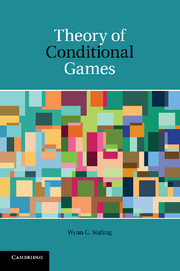4 - Coordination
Published online by Cambridge University Press: 05 January 2012
Summary
A mathematical formalism may be operated in ever new, uncovenanted ways, and force on our hesitant minds the expression of a novel conception.
– Michael Polanyi Personal Knowledge (University of Chicago Press, 1958)Extrinsic versus intrinsic coordination
We begin our discussion in this chapter with a review of the various notions of coordination that appear in the literature. Perhaps the the earliest game-theoretic concept of coordination is that of tacit coordination, as introduced by Schelling (1960). According to this concept, players coordinate if they try to guess what each other will do and make their decisions accordingly. Lewis has provided more structure to this notion by introducing the notion of coordination equilibria. Recall that a Nash equilibrium is an action profile such that no single player would increase its payoff if it acted otherwise alone. Lewis (1969) has refined this idea to define a coordination equilibrium as an action profile such that no single player would increase its payoff had any one player alone acted otherwise, either itself or someone else. A coordination equilibrium is proper if each agent strictly prefers it to any other outcome. Lewis (1969) provides a formal definition of a coordination problem in the context of classical game theory: “Coordination problems … are situations of interdependent decision by two or more agents in which coincidence of interest predominates and in which there are two or more proper coordination equilibria” (p. 24).
- Type
- Chapter
- Information
- Theory of Conditional Games , pp. 96 - 125Publisher: Cambridge University PressPrint publication year: 2011



